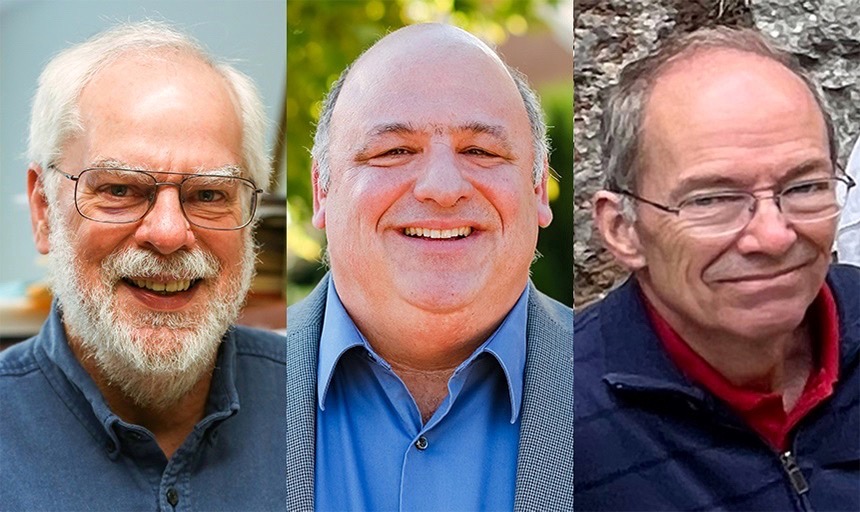
Roanoke College is celebrating the retirement of three faculty members who have collectively devoted 73 years to higher education and student development at Roanoke.
Through their unwavering dedication, these educators have shaped generations of Maroons, guiding them through classes, inspiring them to face challenges and explore different perspectives, and encouraging them to make a difference in their community.
Roanoke College would like to thank these outstanding faculty members for their devotion to the school, the community, and their profession. We wish them retirements filled with joy, relaxation, and time with loved ones.
 Tom Carter, Associate Professor of English and Communications Studies, Emeritus
Tom Carter, Associate Professor of English and Communications Studies, Emeritus
Carter joined the college in 1994, teaching in what was then the English Department. He later helped bring about the Communications Studies program, guiding in-demand courses in Mass Communication, Media Ethics, Journalism, and more.
Carter earned his doctorate in communications from the University of Tennessee. Before teaching, he served as a gunner’s mate technician in the U.S. Navy, spurring an interest in researching WWII and leading him to write a book, “Beachhead Normandy: An LCT’s Odyssey.”
His deeply rooted interest in WWII history gave rise to a May Term course, Symbolic Narrative: National D-Day Memorial, which helps students develop a better understanding of history. He also led an INQ course that was a student favorite, Ghosts and Human Perception, an examination of ghostly lore and perceptions of truth.
Outside of the classroom, Carter served as faculty advisor for Roanoke’s student newspaper, The Brackety-Ack, for 31 years. Known for his guidance and mentorship, he was described by his peers in an honorary resolution as an educator whose “gentle presence and generous wit will be sorely missed.”
 Marc LaChance, Lecturer, Fine Arts
Marc LaChance, Lecturer, Fine Arts
LaChance, a talented musician and instructor, led students inside and outside the classroom as director of Roanoke’s Wind Ensemble and Jazz Ensemble. He joined the Fine Arts Department in 2018, bringing to bear 28 years of experience as a conductor and a professor teaching low brass, music theory, and jazz studies.
A gifted trombonist, LaChance earned his doctorate of musical arts in trombone performance and literature from the University of Illinois. He also performed with ensembles across the nation, including the Northland Opera Theater Experience, Denver Chamber Orchestra, and Toledo Symphony Orchestra.
At Roanoke, LaChance taught classes in music fundamentals, jazz history and improvisation. He also brought humor and charm to many a campus concert. He could be spotted around Olin Hall with his Great Dane, Ingrid, whose sweet temperament earned her numerous fans among students and faculty.
In a resolution honoring LaChance’s retirement, his fellow faculty wrote that he was a “mensch on the bandstand and a pro in the classroom” who will be missed for his spirit and collegiality.
 Hans Zorn, Professor of Philosophy, Emeritus
Hans Zorn, Professor of Philosophy, Emeritus
Zorn, a respected and dedicated expert in the intricacies of philosophy, joined Roanoke as a faculty member in 1990.
He designed the philosophy major and served as a department chair, working tirelessly to build and expand the program. He also aided in designing the innovative INQ curriculum program. Throughout his years of service, he taught and mentored thousands of students as well as advised and trained the Roanoke College VFIC Ethics Bowl team.
Zorn also “delighted and confounded students and faculty alike” with the annual Zeno Contest, his fellow faculty members said. His dedication and hard work were recognized with a Dean’s Exemplary Service Award for his role in influencing the lives of students, faculty, and community members of the Roanoke Valley.
Outside the classroom, Zorn is an accomplished cook, brewer, and gardener. He grew and maintained a banyan tree in his office for students who needed its enlightenment and support.
In a resolution thanking Zorn for his service, his peers wrote of their profound appreciation for his 35 years of dedication to mentoring students and bringing clarity of thought to campus discussions.